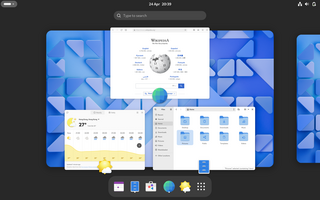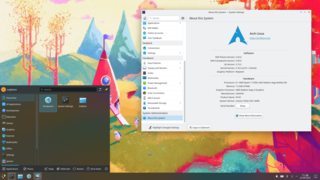Related Research Articles
Variable bitrate (VBR) is a term used in telecommunications and computing that relates to the bitrate used in sound or video encoding. As opposed to constant bitrate (CBR), VBR files vary the amount of output data per time segment. VBR allows a higher bitrate to be allocated to the more complex segments of media files while less space is allocated to less complex segments. The average of these rates can be calculated to produce an average bitrate for the file.
JRuby is an implementation of the Ruby programming language atop the Java Virtual Machine, written largely in Java. It is free software released under a three-way EPL/GPL/LGPL license. JRuby is tightly integrated with Java to allow the embedding of the interpreter into any Java application with full two-way access between the Java and the Ruby code.
In NeXTSTEP, OPENSTEP, GNUstep, and their lineal descendants macOS and iOS, a bundle is a file directory with a defined structure and file extension, allowing related files to be grouped together as a conceptually single item.

Korora was a remix of the Fedora Linux distribution. Originally Kororaa was a binary installation method for Gentoo Linux which aimed for easy installation of a Gentoo system by using install scripts instead of manual configuration. The name derives from the Māori word kororā – the little penguin.

PulseAudio is a network-capable sound server program distributed via the freedesktop.org project. It runs mainly on Linux, various BSD distributions such as FreeBSD and OpenBSD, macOS, as well as Illumos distributions and the Solaris operating system.
Upstart was an event-based replacement for the traditional init daemon—the method by which several Unix-like computer operating systems perform tasks when the computer is started. It was written by Scott James Remnant, a former employee of Canonical Ltd. In 2014, Upstart was placed in maintenance mode, and other init daemons, such as systemd, were recommended in place of Upstart. Ubuntu moved away from Upstart with the release of version 15.04 in favor of migrating to systemd. As of January 2022, there have been no updates released for Upstart since September 2014.

Fedora Linux is a Linux distribution developed by the Fedora Project which is sponsored primarily by Red Hat with additional support and sponsors from other companies and organizations. Fedora contains software distributed under various free and open-source licenses and aims to be on the leading edge of open-source technologies. Fedora is the upstream source for Red Hat Enterprise Linux.
Comparison of the Java and .NET platforms.

PackageKit is a free and open-source suite of software applications designed to provide a consistent and high-level front end for a number of different package management systems. PackageKit was created by Richard Hughes in 2007, and first introduced into an operating system as a default application in May 2008 with the release of Fedora 9.

Wayland is a communication protocol that specifies the communication between a display server and its clients, as well as a C library implementation of that protocol. A display server using the Wayland protocol is called a Wayland compositor, because it additionally performs the task of a compositing window manager.

The Intelligent Input Bus is an input method (IM) framework for multilingual input in Unix-like operating-systems. The name "Bus" comes from its bus-like architecture.

The Chewing (酷音) input method is an intelligent Zhuyin input method. It is one of the most popular input methods among Traditional Chinese Unix users.

GNOME, originally an acronym for GNU Network Object Model Environment, is a free and open-source desktop environment for Linux and other Unix-like operating systems.
Fedora Linux is a popular Linux distribution developed by the Fedora Project. Fedora attempts to maintain a six-month release schedule, offering new versions in May and November, although some releases have experienced minor delays.

Maliit is an input method framework for computers with particular focus on implementing virtual keyboards. Designed mostly for touchscreen devices, Maliit allows the inputting of text without the presence of a physical keyboard. More advanced features such as word correction and prediction are also available.

KDE Plasma 5 is the fifth and current generation of the graphical workspaces environment created by KDE primarily for Linux systems. KDE Plasma 5 is the successor of KDE Plasma 4 and was first released on 15 July 2014.

DNF or Dandified YUM is the next-generation version of the Yellowdog Updater, Modified (yum), a package manager for .rpm-based Linux distributions. DNF was introduced in Fedora 18 in 2013, it has been the default package manager since Fedora 22 in 2015, Red Hat Enterprise Linux 8., and OpenMandriva; and also an alternative package manager for Mageia.
firewalld is a firewall management tool for Linux operating systems. It provides firewall features by acting as a front-end for the Linux kernel's netfilter framework. firewalld's current default backend is nftables. Prior to v0.6.0, iptables was the default backend. Through its abstractions, firewalld acts as an alternative to nft and iptables command line programs. The name firewalld adheres to the Unix convention of naming system daemons by appending the letter "d".
Zstandard, commonly known by the name of its reference implementation zstd, is a lossless data compression algorithm developed by Yann Collet at Facebook. Zstd is the reference implementation in C. Version 1 of this implementation was released as open-source software on 31 August 2016.
The Standardized approach for counterparty credit risk (SA-CCR) is the capital requirement framework under Basel III addressing counterparty risk for derivative trades. It was published by the Basel Committee in March 2014.
References
- ↑ "Fedora Project, sponsored by Red Hat". docs.fedoraproject.org. Archived from the original on 2007-03-27.
- ↑ "IIIMF".
- ↑ "レッドハット | オープンソース・カンパニー". Archived from the original on 2009-09-15. Retrieved 2009-03-17.